Business Law and Legal Systems
VerifiedAdded on 2020/01/23
|11
|3498
|118
Essay
AI Summary
This assignment delves into the realm of business law and legal systems. It requires students to understand fundamental concepts such as the purposes and functions of law, distinctions between domestic and international law, and the relationship between law and ethics. The guide provides insights into various legal areas relevant to businesses, including contracts, tort law, and government contracting. Students are encouraged to analyze diverse perspectives and apply their knowledge to real-world business scenarios.
Contribute Materials
Your contribution can guide someone’s learning journey. Share your
documents today.
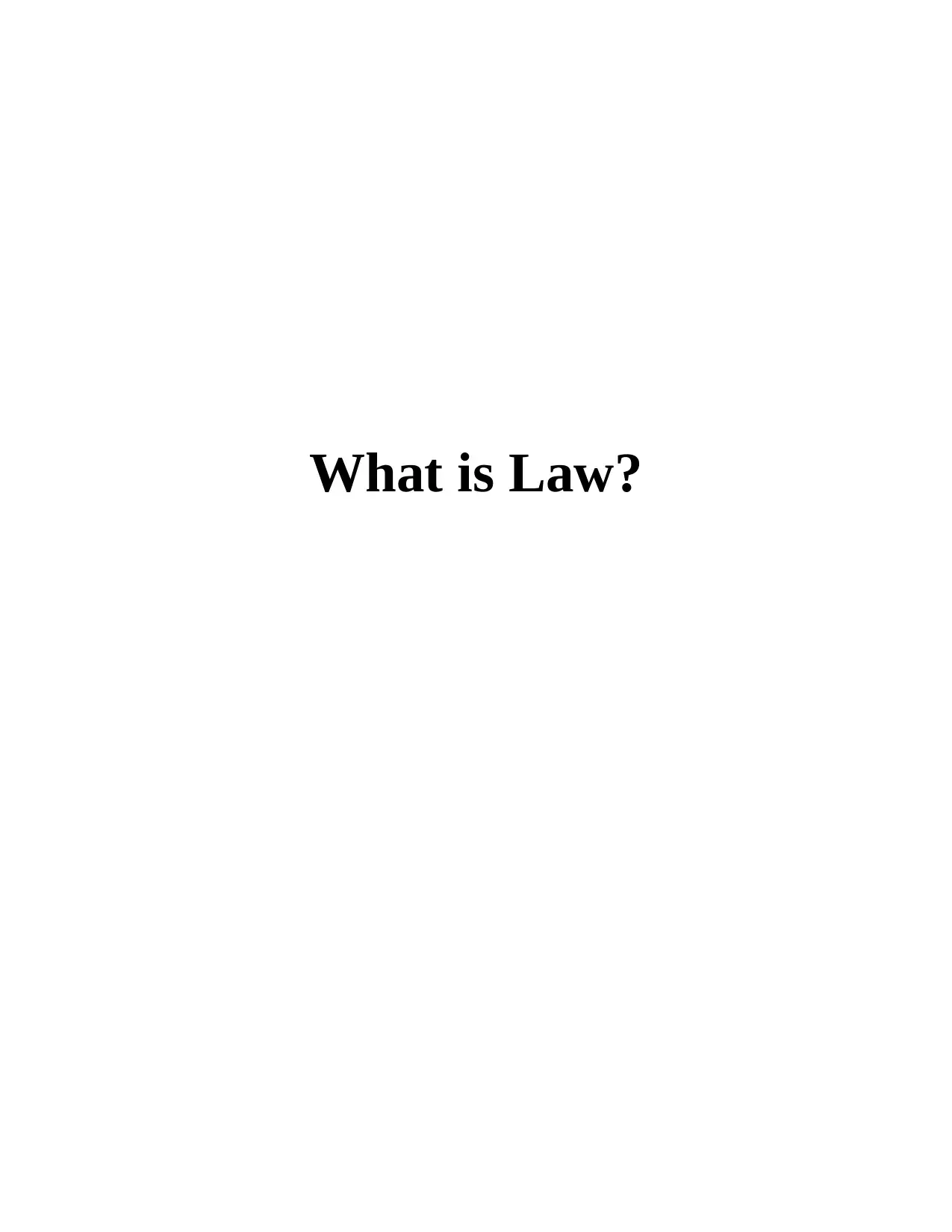
What is Law?
Secure Best Marks with AI Grader
Need help grading? Try our AI Grader for instant feedback on your assignments.
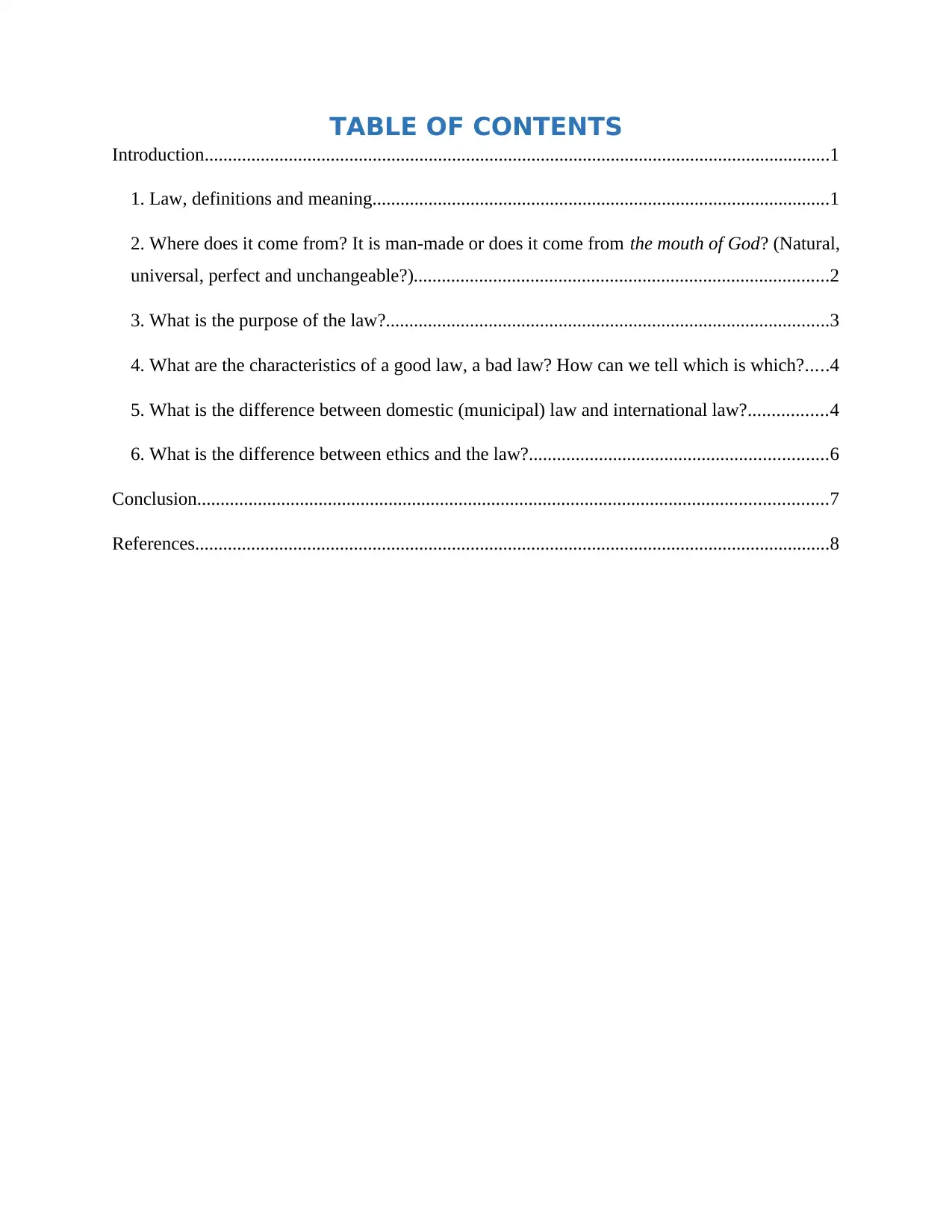
TABLE OF CONTENTS
Introduction......................................................................................................................................1
1. Law, definitions and meaning..................................................................................................1
2. Where does it come from? It is man-made or does it come from the mouth of God? (Natural,
universal, perfect and unchangeable?).........................................................................................2
3. What is the purpose of the law?...............................................................................................3
4. What are the characteristics of a good law, a bad law? How can we tell which is which?.....4
5. What is the difference between domestic (municipal) law and international law?.................4
6. What is the difference between ethics and the law?................................................................6
Conclusion.......................................................................................................................................7
References........................................................................................................................................8
Introduction......................................................................................................................................1
1. Law, definitions and meaning..................................................................................................1
2. Where does it come from? It is man-made or does it come from the mouth of God? (Natural,
universal, perfect and unchangeable?).........................................................................................2
3. What is the purpose of the law?...............................................................................................3
4. What are the characteristics of a good law, a bad law? How can we tell which is which?.....4
5. What is the difference between domestic (municipal) law and international law?.................4
6. What is the difference between ethics and the law?................................................................6
Conclusion.......................................................................................................................................7
References........................................................................................................................................8
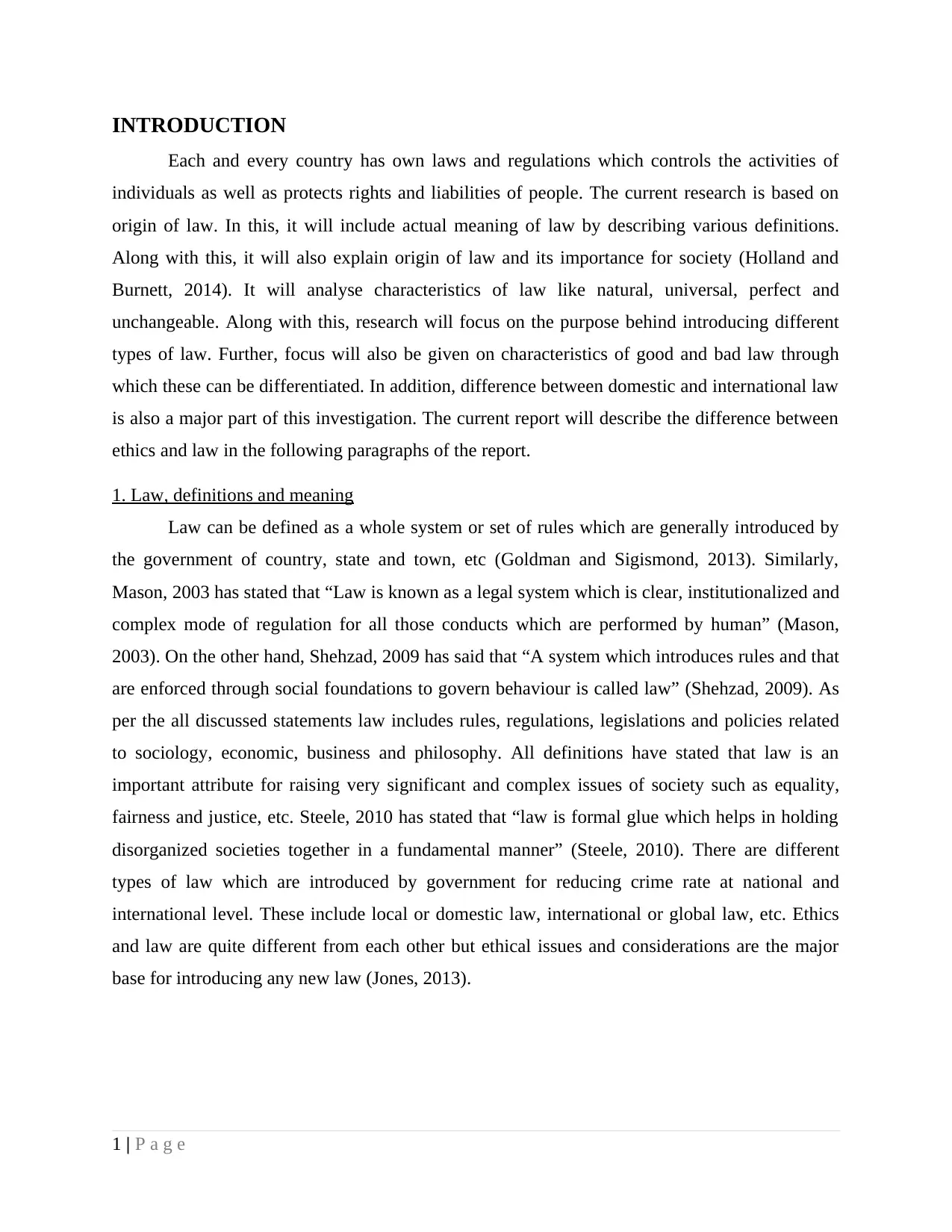
INTRODUCTION
Each and every country has own laws and regulations which controls the activities of
individuals as well as protects rights and liabilities of people. The current research is based on
origin of law. In this, it will include actual meaning of law by describing various definitions.
Along with this, it will also explain origin of law and its importance for society (Holland and
Burnett, 2014). It will analyse characteristics of law like natural, universal, perfect and
unchangeable. Along with this, research will focus on the purpose behind introducing different
types of law. Further, focus will also be given on characteristics of good and bad law through
which these can be differentiated. In addition, difference between domestic and international law
is also a major part of this investigation. The current report will describe the difference between
ethics and law in the following paragraphs of the report.
1. Law, definitions and meaning
Law can be defined as a whole system or set of rules which are generally introduced by
the government of country, state and town, etc (Goldman and Sigismond, 2013). Similarly,
Mason, 2003 has stated that “Law is known as a legal system which is clear, institutionalized and
complex mode of regulation for all those conducts which are performed by human” (Mason,
2003). On the other hand, Shehzad, 2009 has said that “A system which introduces rules and that
are enforced through social foundations to govern behaviour is called law” (Shehzad, 2009). As
per the all discussed statements law includes rules, regulations, legislations and policies related
to sociology, economic, business and philosophy. All definitions have stated that law is an
important attribute for raising very significant and complex issues of society such as equality,
fairness and justice, etc. Steele, 2010 has stated that “law is formal glue which helps in holding
disorganized societies together in a fundamental manner” (Steele, 2010). There are different
types of law which are introduced by government for reducing crime rate at national and
international level. These include local or domestic law, international or global law, etc. Ethics
and law are quite different from each other but ethical issues and considerations are the major
base for introducing any new law (Jones, 2013).
1 | P a g e
Each and every country has own laws and regulations which controls the activities of
individuals as well as protects rights and liabilities of people. The current research is based on
origin of law. In this, it will include actual meaning of law by describing various definitions.
Along with this, it will also explain origin of law and its importance for society (Holland and
Burnett, 2014). It will analyse characteristics of law like natural, universal, perfect and
unchangeable. Along with this, research will focus on the purpose behind introducing different
types of law. Further, focus will also be given on characteristics of good and bad law through
which these can be differentiated. In addition, difference between domestic and international law
is also a major part of this investigation. The current report will describe the difference between
ethics and law in the following paragraphs of the report.
1. Law, definitions and meaning
Law can be defined as a whole system or set of rules which are generally introduced by
the government of country, state and town, etc (Goldman and Sigismond, 2013). Similarly,
Mason, 2003 has stated that “Law is known as a legal system which is clear, institutionalized and
complex mode of regulation for all those conducts which are performed by human” (Mason,
2003). On the other hand, Shehzad, 2009 has said that “A system which introduces rules and that
are enforced through social foundations to govern behaviour is called law” (Shehzad, 2009). As
per the all discussed statements law includes rules, regulations, legislations and policies related
to sociology, economic, business and philosophy. All definitions have stated that law is an
important attribute for raising very significant and complex issues of society such as equality,
fairness and justice, etc. Steele, 2010 has stated that “law is formal glue which helps in holding
disorganized societies together in a fundamental manner” (Steele, 2010). There are different
types of law which are introduced by government for reducing crime rate at national and
international level. These include local or domestic law, international or global law, etc. Ethics
and law are quite different from each other but ethical issues and considerations are the major
base for introducing any new law (Jones, 2013).
1 | P a g e
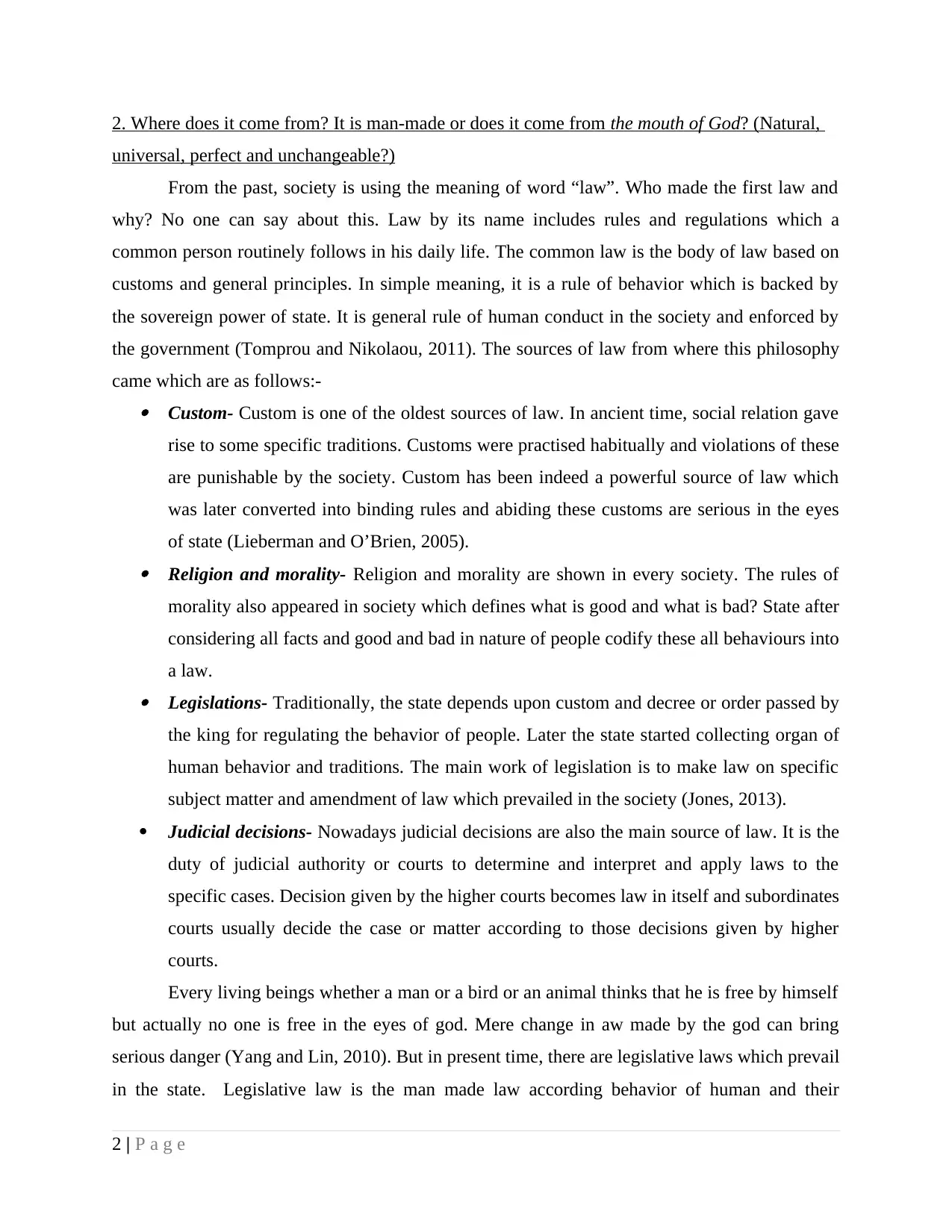
2. Where does it come from? It is man-made or does it come from the mouth of God? (Natural,
universal, perfect and unchangeable?)
From the past, society is using the meaning of word “law”. Who made the first law and
why? No one can say about this. Law by its name includes rules and regulations which a
common person routinely follows in his daily life. The common law is the body of law based on
customs and general principles. In simple meaning, it is a rule of behavior which is backed by
the sovereign power of state. It is general rule of human conduct in the society and enforced by
the government (Tomprou and Nikolaou, 2011). The sources of law from where this philosophy
came which are as follows:- Custom- Custom is one of the oldest sources of law. In ancient time, social relation gave
rise to some specific traditions. Customs were practised habitually and violations of these
are punishable by the society. Custom has been indeed a powerful source of law which
was later converted into binding rules and abiding these customs are serious in the eyes
of state (Lieberman and O’Brien, 2005). Religion and morality- Religion and morality are shown in every society. The rules of
morality also appeared in society which defines what is good and what is bad? State after
considering all facts and good and bad in nature of people codify these all behaviours into
a law. Legislations- Traditionally, the state depends upon custom and decree or order passed by
the king for regulating the behavior of people. Later the state started collecting organ of
human behavior and traditions. The main work of legislation is to make law on specific
subject matter and amendment of law which prevailed in the society (Jones, 2013).
Judicial decisions- Nowadays judicial decisions are also the main source of law. It is the
duty of judicial authority or courts to determine and interpret and apply laws to the
specific cases. Decision given by the higher courts becomes law in itself and subordinates
courts usually decide the case or matter according to those decisions given by higher
courts.
Every living beings whether a man or a bird or an animal thinks that he is free by himself
but actually no one is free in the eyes of god. Mere change in aw made by the god can bring
serious danger (Yang and Lin, 2010). But in present time, there are legislative laws which prevail
in the state. Legislative law is the man made law according behavior of human and their
2 | P a g e
universal, perfect and unchangeable?)
From the past, society is using the meaning of word “law”. Who made the first law and
why? No one can say about this. Law by its name includes rules and regulations which a
common person routinely follows in his daily life. The common law is the body of law based on
customs and general principles. In simple meaning, it is a rule of behavior which is backed by
the sovereign power of state. It is general rule of human conduct in the society and enforced by
the government (Tomprou and Nikolaou, 2011). The sources of law from where this philosophy
came which are as follows:- Custom- Custom is one of the oldest sources of law. In ancient time, social relation gave
rise to some specific traditions. Customs were practised habitually and violations of these
are punishable by the society. Custom has been indeed a powerful source of law which
was later converted into binding rules and abiding these customs are serious in the eyes
of state (Lieberman and O’Brien, 2005). Religion and morality- Religion and morality are shown in every society. The rules of
morality also appeared in society which defines what is good and what is bad? State after
considering all facts and good and bad in nature of people codify these all behaviours into
a law. Legislations- Traditionally, the state depends upon custom and decree or order passed by
the king for regulating the behavior of people. Later the state started collecting organ of
human behavior and traditions. The main work of legislation is to make law on specific
subject matter and amendment of law which prevailed in the society (Jones, 2013).
Judicial decisions- Nowadays judicial decisions are also the main source of law. It is the
duty of judicial authority or courts to determine and interpret and apply laws to the
specific cases. Decision given by the higher courts becomes law in itself and subordinates
courts usually decide the case or matter according to those decisions given by higher
courts.
Every living beings whether a man or a bird or an animal thinks that he is free by himself
but actually no one is free in the eyes of god. Mere change in aw made by the god can bring
serious danger (Yang and Lin, 2010). But in present time, there are legislative laws which prevail
in the state. Legislative law is the man made law according behavior of human and their
2 | P a g e
Secure Best Marks with AI Grader
Need help grading? Try our AI Grader for instant feedback on your assignments.
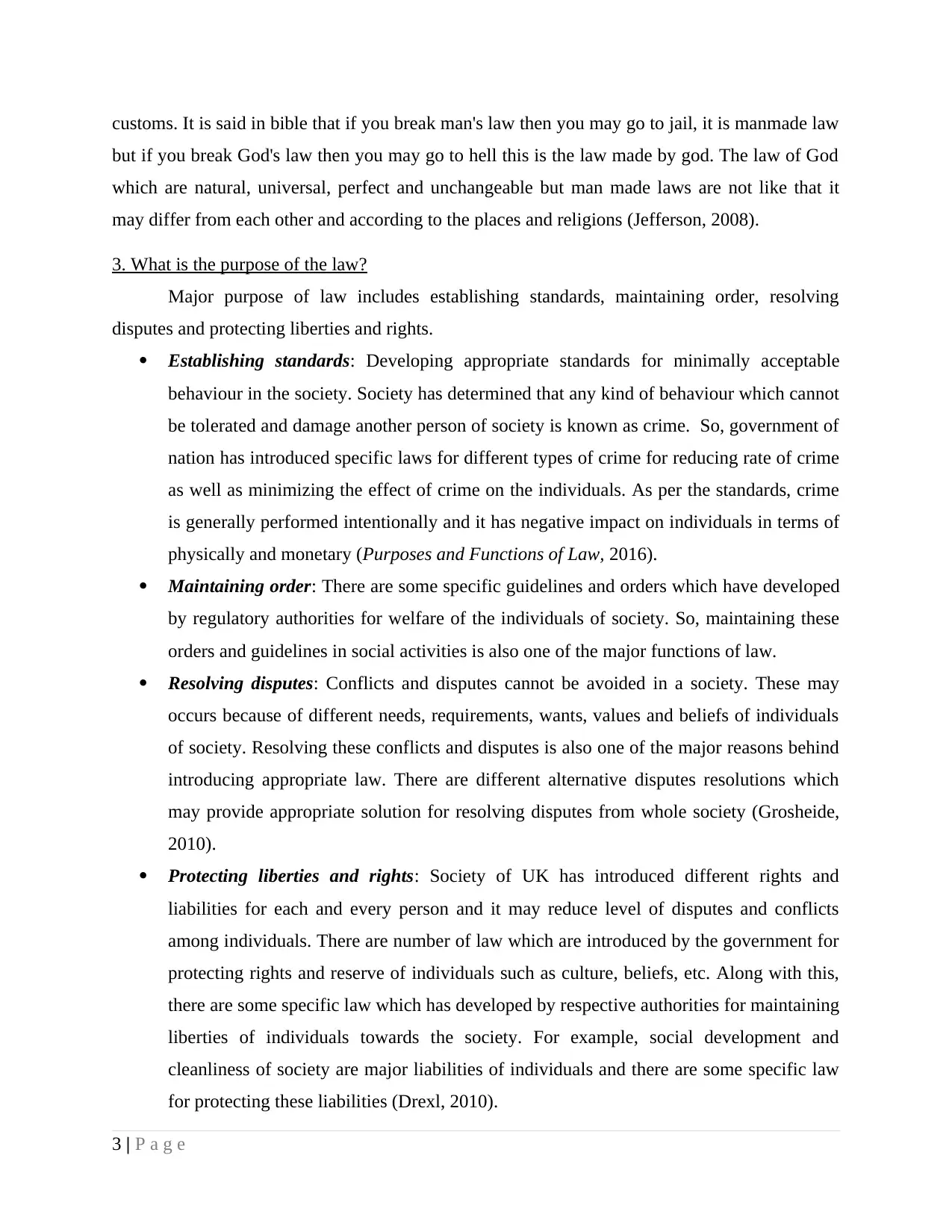
customs. It is said in bible that if you break man's law then you may go to jail, it is manmade law
but if you break God's law then you may go to hell this is the law made by god. The law of God
which are natural, universal, perfect and unchangeable but man made laws are not like that it
may differ from each other and according to the places and religions (Jefferson, 2008).
3. What is the purpose of the law?
Major purpose of law includes establishing standards, maintaining order, resolving
disputes and protecting liberties and rights.
Establishing standards: Developing appropriate standards for minimally acceptable
behaviour in the society. Society has determined that any kind of behaviour which cannot
be tolerated and damage another person of society is known as crime. So, government of
nation has introduced specific laws for different types of crime for reducing rate of crime
as well as minimizing the effect of crime on the individuals. As per the standards, crime
is generally performed intentionally and it has negative impact on individuals in terms of
physically and monetary (Purposes and Functions of Law, 2016).
Maintaining order: There are some specific guidelines and orders which have developed
by regulatory authorities for welfare of the individuals of society. So, maintaining these
orders and guidelines in social activities is also one of the major functions of law.
Resolving disputes: Conflicts and disputes cannot be avoided in a society. These may
occurs because of different needs, requirements, wants, values and beliefs of individuals
of society. Resolving these conflicts and disputes is also one of the major reasons behind
introducing appropriate law. There are different alternative disputes resolutions which
may provide appropriate solution for resolving disputes from whole society (Grosheide,
2010).
Protecting liberties and rights: Society of UK has introduced different rights and
liabilities for each and every person and it may reduce level of disputes and conflicts
among individuals. There are number of law which are introduced by the government for
protecting rights and reserve of individuals such as culture, beliefs, etc. Along with this,
there are some specific law which has developed by respective authorities for maintaining
liberties of individuals towards the society. For example, social development and
cleanliness of society are major liabilities of individuals and there are some specific law
for protecting these liabilities (Drexl, 2010).
3 | P a g e
but if you break God's law then you may go to hell this is the law made by god. The law of God
which are natural, universal, perfect and unchangeable but man made laws are not like that it
may differ from each other and according to the places and religions (Jefferson, 2008).
3. What is the purpose of the law?
Major purpose of law includes establishing standards, maintaining order, resolving
disputes and protecting liberties and rights.
Establishing standards: Developing appropriate standards for minimally acceptable
behaviour in the society. Society has determined that any kind of behaviour which cannot
be tolerated and damage another person of society is known as crime. So, government of
nation has introduced specific laws for different types of crime for reducing rate of crime
as well as minimizing the effect of crime on the individuals. As per the standards, crime
is generally performed intentionally and it has negative impact on individuals in terms of
physically and monetary (Purposes and Functions of Law, 2016).
Maintaining order: There are some specific guidelines and orders which have developed
by regulatory authorities for welfare of the individuals of society. So, maintaining these
orders and guidelines in social activities is also one of the major functions of law.
Resolving disputes: Conflicts and disputes cannot be avoided in a society. These may
occurs because of different needs, requirements, wants, values and beliefs of individuals
of society. Resolving these conflicts and disputes is also one of the major reasons behind
introducing appropriate law. There are different alternative disputes resolutions which
may provide appropriate solution for resolving disputes from whole society (Grosheide,
2010).
Protecting liberties and rights: Society of UK has introduced different rights and
liabilities for each and every person and it may reduce level of disputes and conflicts
among individuals. There are number of law which are introduced by the government for
protecting rights and reserve of individuals such as culture, beliefs, etc. Along with this,
there are some specific law which has developed by respective authorities for maintaining
liberties of individuals towards the society. For example, social development and
cleanliness of society are major liabilities of individuals and there are some specific law
for protecting these liabilities (Drexl, 2010).
3 | P a g e
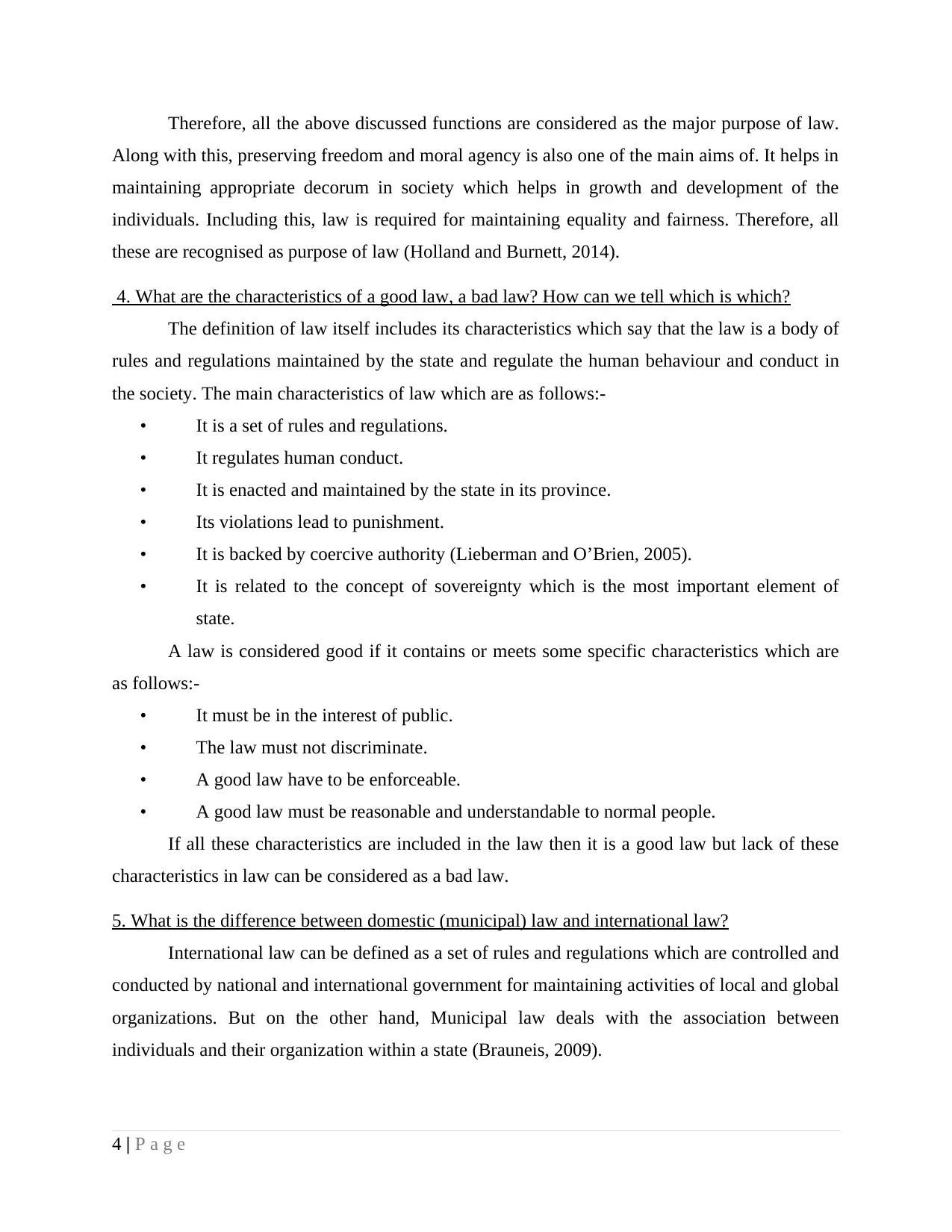
Therefore, all the above discussed functions are considered as the major purpose of law.
Along with this, preserving freedom and moral agency is also one of the main aims of. It helps in
maintaining appropriate decorum in society which helps in growth and development of the
individuals. Including this, law is required for maintaining equality and fairness. Therefore, all
these are recognised as purpose of law (Holland and Burnett, 2014).
4. What are the characteristics of a good law, a bad law? How can we tell which is which?
The definition of law itself includes its characteristics which say that the law is a body of
rules and regulations maintained by the state and regulate the human behaviour and conduct in
the society. The main characteristics of law which are as follows:-
• It is a set of rules and regulations.
• It regulates human conduct.
• It is enacted and maintained by the state in its province.
• Its violations lead to punishment.
• It is backed by coercive authority (Lieberman and O’Brien, 2005).
• It is related to the concept of sovereignty which is the most important element of
state.
A law is considered good if it contains or meets some specific characteristics which are
as follows:-
• It must be in the interest of public.
• The law must not discriminate.
• A good law have to be enforceable.
• A good law must be reasonable and understandable to normal people.
If all these characteristics are included in the law then it is a good law but lack of these
characteristics in law can be considered as a bad law.
5. What is the difference between domestic (municipal) law and international law?
International law can be defined as a set of rules and regulations which are controlled and
conducted by national and international government for maintaining activities of local and global
organizations. But on the other hand, Municipal law deals with the association between
individuals and their organization within a state (Brauneis, 2009).
4 | P a g e
Along with this, preserving freedom and moral agency is also one of the main aims of. It helps in
maintaining appropriate decorum in society which helps in growth and development of the
individuals. Including this, law is required for maintaining equality and fairness. Therefore, all
these are recognised as purpose of law (Holland and Burnett, 2014).
4. What are the characteristics of a good law, a bad law? How can we tell which is which?
The definition of law itself includes its characteristics which say that the law is a body of
rules and regulations maintained by the state and regulate the human behaviour and conduct in
the society. The main characteristics of law which are as follows:-
• It is a set of rules and regulations.
• It regulates human conduct.
• It is enacted and maintained by the state in its province.
• Its violations lead to punishment.
• It is backed by coercive authority (Lieberman and O’Brien, 2005).
• It is related to the concept of sovereignty which is the most important element of
state.
A law is considered good if it contains or meets some specific characteristics which are
as follows:-
• It must be in the interest of public.
• The law must not discriminate.
• A good law have to be enforceable.
• A good law must be reasonable and understandable to normal people.
If all these characteristics are included in the law then it is a good law but lack of these
characteristics in law can be considered as a bad law.
5. What is the difference between domestic (municipal) law and international law?
International law can be defined as a set of rules and regulations which are controlled and
conducted by national and international government for maintaining activities of local and global
organizations. But on the other hand, Municipal law deals with the association between
individuals and their organization within a state (Brauneis, 2009).
4 | P a g e
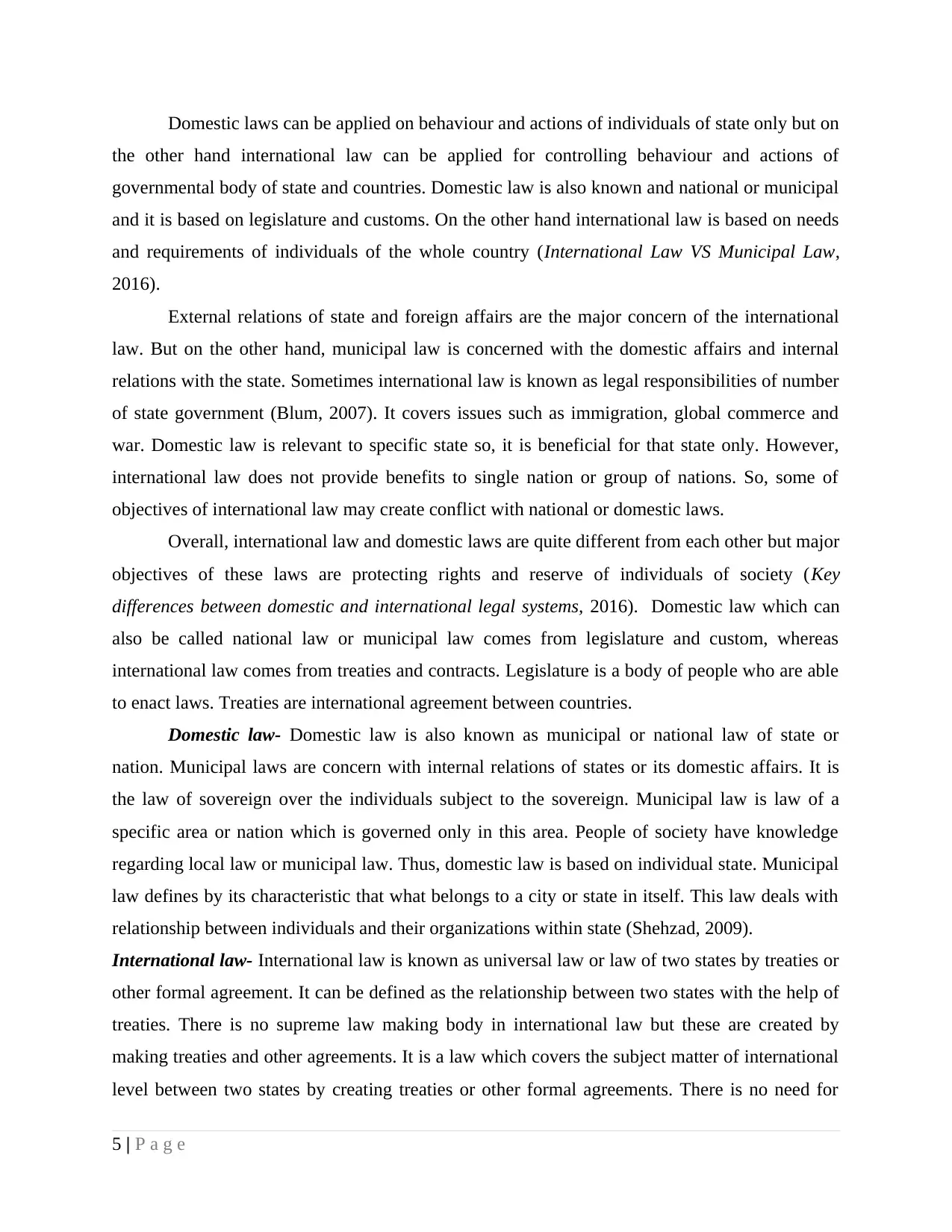
Domestic laws can be applied on behaviour and actions of individuals of state only but on
the other hand international law can be applied for controlling behaviour and actions of
governmental body of state and countries. Domestic law is also known and national or municipal
and it is based on legislature and customs. On the other hand international law is based on needs
and requirements of individuals of the whole country (International Law VS Municipal Law,
2016).
External relations of state and foreign affairs are the major concern of the international
law. But on the other hand, municipal law is concerned with the domestic affairs and internal
relations with the state. Sometimes international law is known as legal responsibilities of number
of state government (Blum, 2007). It covers issues such as immigration, global commerce and
war. Domestic law is relevant to specific state so, it is beneficial for that state only. However,
international law does not provide benefits to single nation or group of nations. So, some of
objectives of international law may create conflict with national or domestic laws.
Overall, international law and domestic laws are quite different from each other but major
objectives of these laws are protecting rights and reserve of individuals of society (Key
differences between domestic and international legal systems, 2016). Domestic law which can
also be called national law or municipal law comes from legislature and custom, whereas
international law comes from treaties and contracts. Legislature is a body of people who are able
to enact laws. Treaties are international agreement between countries.
Domestic law- Domestic law is also known as municipal or national law of state or
nation. Municipal laws are concern with internal relations of states or its domestic affairs. It is
the law of sovereign over the individuals subject to the sovereign. Municipal law is law of a
specific area or nation which is governed only in this area. People of society have knowledge
regarding local law or municipal law. Thus, domestic law is based on individual state. Municipal
law defines by its characteristic that what belongs to a city or state in itself. This law deals with
relationship between individuals and their organizations within state (Shehzad, 2009).
International law- International law is known as universal law or law of two states by treaties or
other formal agreement. It can be defined as the relationship between two states with the help of
treaties. There is no supreme law making body in international law but these are created by
making treaties and other agreements. It is a law which covers the subject matter of international
level between two states by creating treaties or other formal agreements. There is no need for
5 | P a g e
the other hand international law can be applied for controlling behaviour and actions of
governmental body of state and countries. Domestic law is also known and national or municipal
and it is based on legislature and customs. On the other hand international law is based on needs
and requirements of individuals of the whole country (International Law VS Municipal Law,
2016).
External relations of state and foreign affairs are the major concern of the international
law. But on the other hand, municipal law is concerned with the domestic affairs and internal
relations with the state. Sometimes international law is known as legal responsibilities of number
of state government (Blum, 2007). It covers issues such as immigration, global commerce and
war. Domestic law is relevant to specific state so, it is beneficial for that state only. However,
international law does not provide benefits to single nation or group of nations. So, some of
objectives of international law may create conflict with national or domestic laws.
Overall, international law and domestic laws are quite different from each other but major
objectives of these laws are protecting rights and reserve of individuals of society (Key
differences between domestic and international legal systems, 2016). Domestic law which can
also be called national law or municipal law comes from legislature and custom, whereas
international law comes from treaties and contracts. Legislature is a body of people who are able
to enact laws. Treaties are international agreement between countries.
Domestic law- Domestic law is also known as municipal or national law of state or
nation. Municipal laws are concern with internal relations of states or its domestic affairs. It is
the law of sovereign over the individuals subject to the sovereign. Municipal law is law of a
specific area or nation which is governed only in this area. People of society have knowledge
regarding local law or municipal law. Thus, domestic law is based on individual state. Municipal
law defines by its characteristic that what belongs to a city or state in itself. This law deals with
relationship between individuals and their organizations within state (Shehzad, 2009).
International law- International law is known as universal law or law of two states by treaties or
other formal agreement. It can be defined as the relationship between two states with the help of
treaties. There is no supreme law making body in international law but these are created by
making treaties and other agreements. It is a law which covers the subject matter of international
level between two states by creating treaties or other formal agreements. There is no need for
5 | P a g e
Paraphrase This Document
Need a fresh take? Get an instant paraphrase of this document with our AI Paraphraser
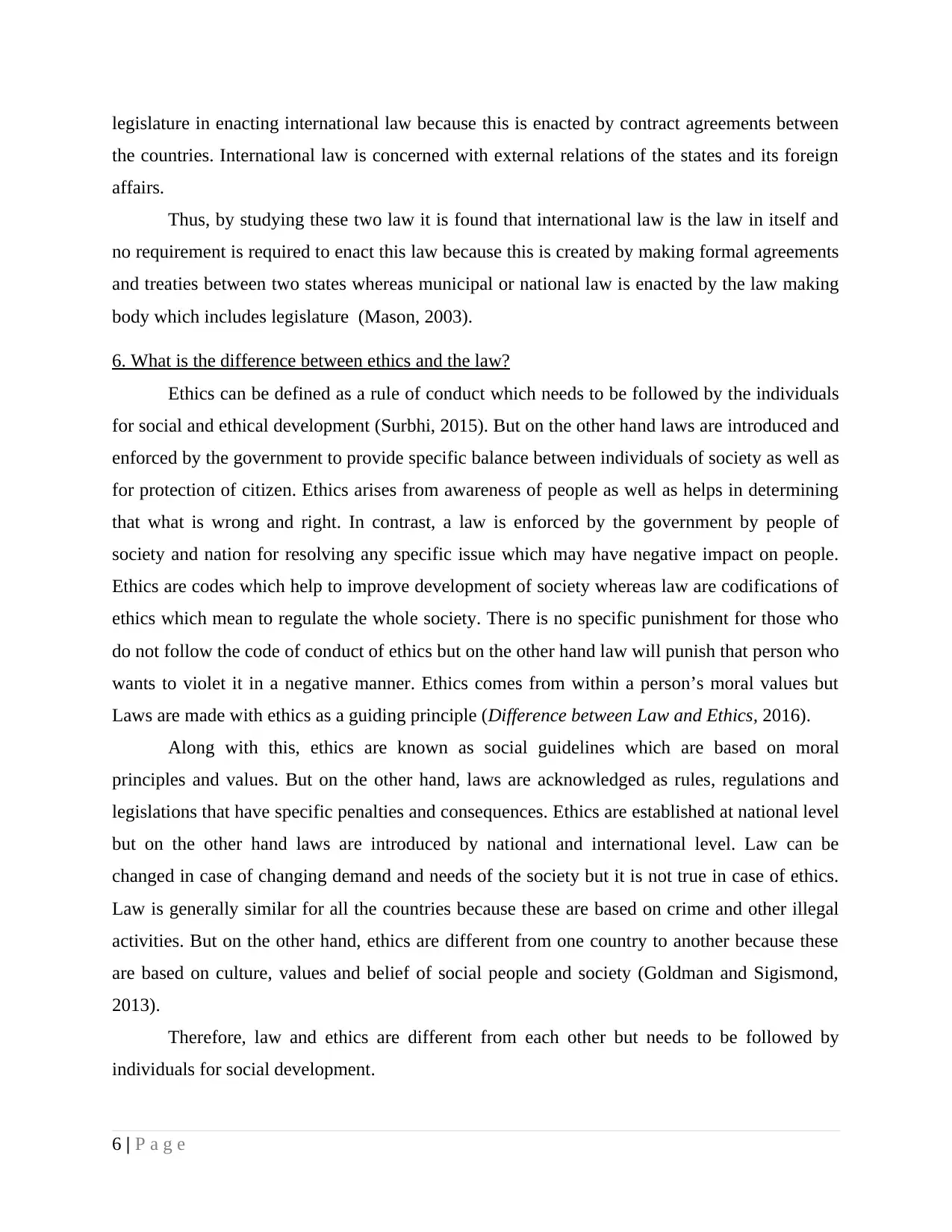
legislature in enacting international law because this is enacted by contract agreements between
the countries. International law is concerned with external relations of the states and its foreign
affairs.
Thus, by studying these two law it is found that international law is the law in itself and
no requirement is required to enact this law because this is created by making formal agreements
and treaties between two states whereas municipal or national law is enacted by the law making
body which includes legislature (Mason, 2003).
6. What is the difference between ethics and the law?
Ethics can be defined as a rule of conduct which needs to be followed by the individuals
for social and ethical development (Surbhi, 2015). But on the other hand laws are introduced and
enforced by the government to provide specific balance between individuals of society as well as
for protection of citizen. Ethics arises from awareness of people as well as helps in determining
that what is wrong and right. In contrast, a law is enforced by the government by people of
society and nation for resolving any specific issue which may have negative impact on people.
Ethics are codes which help to improve development of society whereas law are codifications of
ethics which mean to regulate the whole society. There is no specific punishment for those who
do not follow the code of conduct of ethics but on the other hand law will punish that person who
wants to violet it in a negative manner. Ethics comes from within a person’s moral values but
Laws are made with ethics as a guiding principle (Difference between Law and Ethics, 2016).
Along with this, ethics are known as social guidelines which are based on moral
principles and values. But on the other hand, laws are acknowledged as rules, regulations and
legislations that have specific penalties and consequences. Ethics are established at national level
but on the other hand laws are introduced by national and international level. Law can be
changed in case of changing demand and needs of the society but it is not true in case of ethics.
Law is generally similar for all the countries because these are based on crime and other illegal
activities. But on the other hand, ethics are different from one country to another because these
are based on culture, values and belief of social people and society (Goldman and Sigismond,
2013).
Therefore, law and ethics are different from each other but needs to be followed by
individuals for social development.
6 | P a g e
the countries. International law is concerned with external relations of the states and its foreign
affairs.
Thus, by studying these two law it is found that international law is the law in itself and
no requirement is required to enact this law because this is created by making formal agreements
and treaties between two states whereas municipal or national law is enacted by the law making
body which includes legislature (Mason, 2003).
6. What is the difference between ethics and the law?
Ethics can be defined as a rule of conduct which needs to be followed by the individuals
for social and ethical development (Surbhi, 2015). But on the other hand laws are introduced and
enforced by the government to provide specific balance between individuals of society as well as
for protection of citizen. Ethics arises from awareness of people as well as helps in determining
that what is wrong and right. In contrast, a law is enforced by the government by people of
society and nation for resolving any specific issue which may have negative impact on people.
Ethics are codes which help to improve development of society whereas law are codifications of
ethics which mean to regulate the whole society. There is no specific punishment for those who
do not follow the code of conduct of ethics but on the other hand law will punish that person who
wants to violet it in a negative manner. Ethics comes from within a person’s moral values but
Laws are made with ethics as a guiding principle (Difference between Law and Ethics, 2016).
Along with this, ethics are known as social guidelines which are based on moral
principles and values. But on the other hand, laws are acknowledged as rules, regulations and
legislations that have specific penalties and consequences. Ethics are established at national level
but on the other hand laws are introduced by national and international level. Law can be
changed in case of changing demand and needs of the society but it is not true in case of ethics.
Law is generally similar for all the countries because these are based on crime and other illegal
activities. But on the other hand, ethics are different from one country to another because these
are based on culture, values and belief of social people and society (Goldman and Sigismond,
2013).
Therefore, law and ethics are different from each other but needs to be followed by
individuals for social development.
6 | P a g e
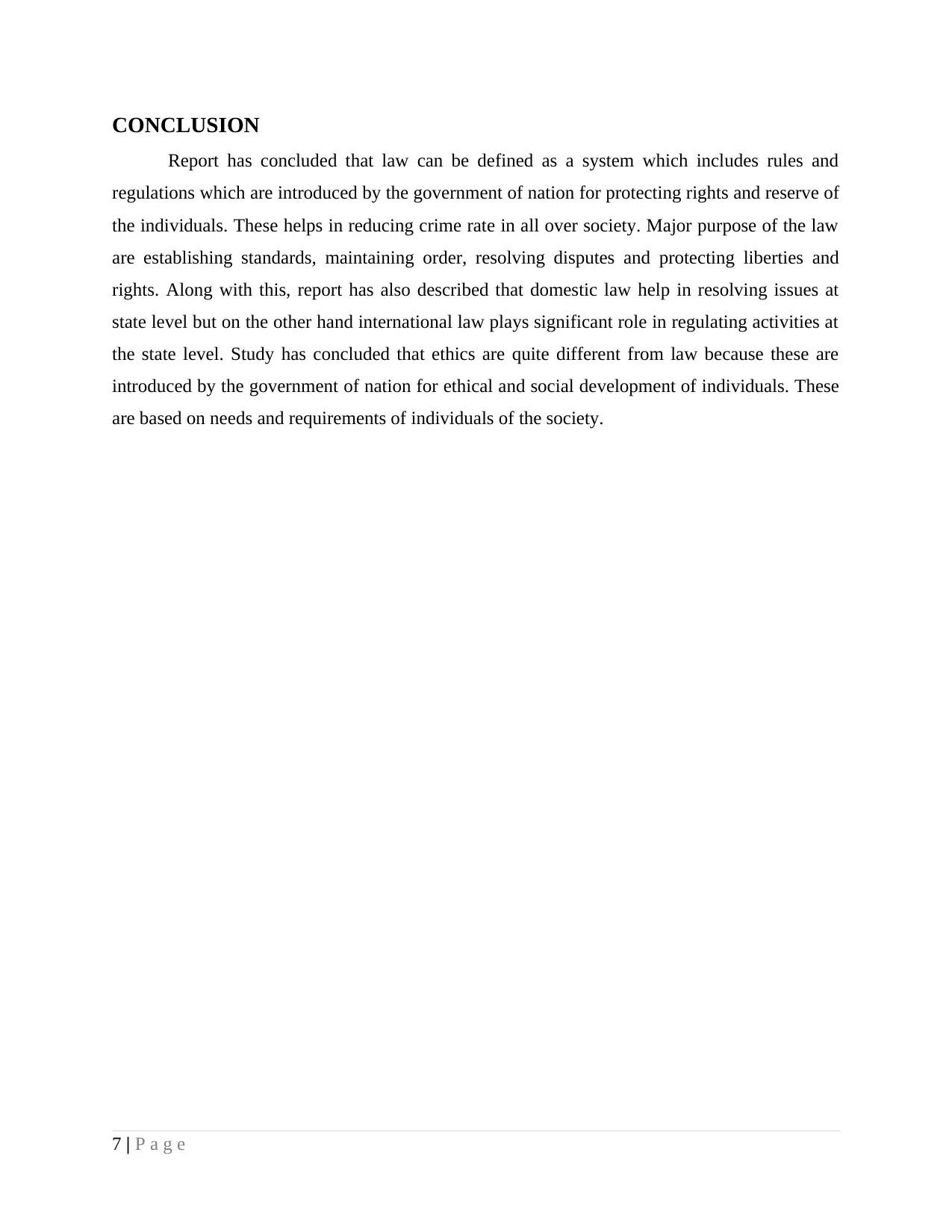
CONCLUSION
Report has concluded that law can be defined as a system which includes rules and
regulations which are introduced by the government of nation for protecting rights and reserve of
the individuals. These helps in reducing crime rate in all over society. Major purpose of the law
are establishing standards, maintaining order, resolving disputes and protecting liberties and
rights. Along with this, report has also described that domestic law help in resolving issues at
state level but on the other hand international law plays significant role in regulating activities at
the state level. Study has concluded that ethics are quite different from law because these are
introduced by the government of nation for ethical and social development of individuals. These
are based on needs and requirements of individuals of the society.
7 | P a g e
Report has concluded that law can be defined as a system which includes rules and
regulations which are introduced by the government of nation for protecting rights and reserve of
the individuals. These helps in reducing crime rate in all over society. Major purpose of the law
are establishing standards, maintaining order, resolving disputes and protecting liberties and
rights. Along with this, report has also described that domestic law help in resolving issues at
state level but on the other hand international law plays significant role in regulating activities at
the state level. Study has concluded that ethics are quite different from law because these are
introduced by the government of nation for ethical and social development of individuals. These
are based on needs and requirements of individuals of the society.
7 | P a g e
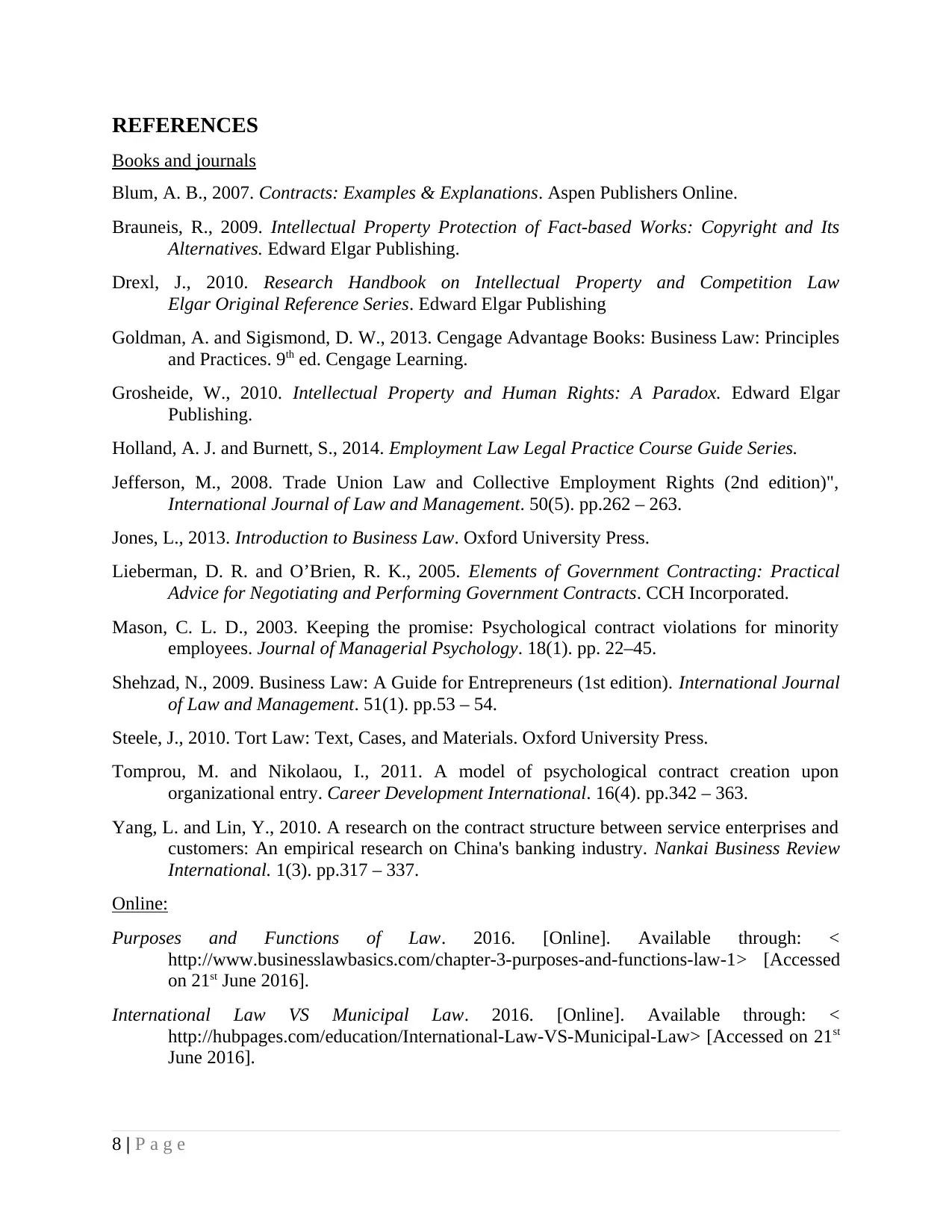
REFERENCES
Books and journals
Blum, A. B., 2007. Contracts: Examples & Explanations. Aspen Publishers Online.
Brauneis, R., 2009. Intellectual Property Protection of Fact-based Works: Copyright and Its
Alternatives. Edward Elgar Publishing.
Drexl, J., 2010. Research Handbook on Intellectual Property and Competition Law
Elgar Original Reference Series. Edward Elgar Publishing
Goldman, A. and Sigismond, D. W., 2013. Cengage Advantage Books: Business Law: Principles
and Practices. 9th ed. Cengage Learning.
Grosheide, W., 2010. Intellectual Property and Human Rights: A Paradox. Edward Elgar
Publishing.
Holland, A. J. and Burnett, S., 2014. Employment Law Legal Practice Course Guide Series.
Jefferson, M., 2008. Trade Union Law and Collective Employment Rights (2nd edition)",
International Journal of Law and Management. 50(5). pp.262 – 263.
Jones, L., 2013. Introduction to Business Law. Oxford University Press.
Lieberman, D. R. and O’Brien, R. K., 2005. Elements of Government Contracting: Practical
Advice for Negotiating and Performing Government Contracts. CCH Incorporated.
Mason, C. L. D., 2003. Keeping the promise: Psychological contract violations for minority
employees. Journal of Managerial Psychology. 18(1). pp. 22–45.
Shehzad, N., 2009. Business Law: A Guide for Entrepreneurs (1st edition). International Journal
of Law and Management. 51(1). pp.53 – 54.
Steele, J., 2010. Tort Law: Text, Cases, and Materials. Oxford University Press.
Tomprou, M. and Nikolaou, I., 2011. A model of psychological contract creation upon
organizational entry. Career Development International. 16(4). pp.342 – 363.
Yang, L. and Lin, Y., 2010. A research on the contract structure between service enterprises and
customers: An empirical research on China's banking industry. Nankai Business Review
International. 1(3). pp.317 – 337.
Online:
Purposes and Functions of Law. 2016. [Online]. Available through: <
http://www.businesslawbasics.com/chapter-3-purposes-and-functions-law-1> [Accessed
on 21st June 2016].
International Law VS Municipal Law. 2016. [Online]. Available through: <
http://hubpages.com/education/International-Law-VS-Municipal-Law> [Accessed on 21st
June 2016].
8 | P a g e
Books and journals
Blum, A. B., 2007. Contracts: Examples & Explanations. Aspen Publishers Online.
Brauneis, R., 2009. Intellectual Property Protection of Fact-based Works: Copyright and Its
Alternatives. Edward Elgar Publishing.
Drexl, J., 2010. Research Handbook on Intellectual Property and Competition Law
Elgar Original Reference Series. Edward Elgar Publishing
Goldman, A. and Sigismond, D. W., 2013. Cengage Advantage Books: Business Law: Principles
and Practices. 9th ed. Cengage Learning.
Grosheide, W., 2010. Intellectual Property and Human Rights: A Paradox. Edward Elgar
Publishing.
Holland, A. J. and Burnett, S., 2014. Employment Law Legal Practice Course Guide Series.
Jefferson, M., 2008. Trade Union Law and Collective Employment Rights (2nd edition)",
International Journal of Law and Management. 50(5). pp.262 – 263.
Jones, L., 2013. Introduction to Business Law. Oxford University Press.
Lieberman, D. R. and O’Brien, R. K., 2005. Elements of Government Contracting: Practical
Advice for Negotiating and Performing Government Contracts. CCH Incorporated.
Mason, C. L. D., 2003. Keeping the promise: Psychological contract violations for minority
employees. Journal of Managerial Psychology. 18(1). pp. 22–45.
Shehzad, N., 2009. Business Law: A Guide for Entrepreneurs (1st edition). International Journal
of Law and Management. 51(1). pp.53 – 54.
Steele, J., 2010. Tort Law: Text, Cases, and Materials. Oxford University Press.
Tomprou, M. and Nikolaou, I., 2011. A model of psychological contract creation upon
organizational entry. Career Development International. 16(4). pp.342 – 363.
Yang, L. and Lin, Y., 2010. A research on the contract structure between service enterprises and
customers: An empirical research on China's banking industry. Nankai Business Review
International. 1(3). pp.317 – 337.
Online:
Purposes and Functions of Law. 2016. [Online]. Available through: <
http://www.businesslawbasics.com/chapter-3-purposes-and-functions-law-1> [Accessed
on 21st June 2016].
International Law VS Municipal Law. 2016. [Online]. Available through: <
http://hubpages.com/education/International-Law-VS-Municipal-Law> [Accessed on 21st
June 2016].
8 | P a g e
Secure Best Marks with AI Grader
Need help grading? Try our AI Grader for instant feedback on your assignments.
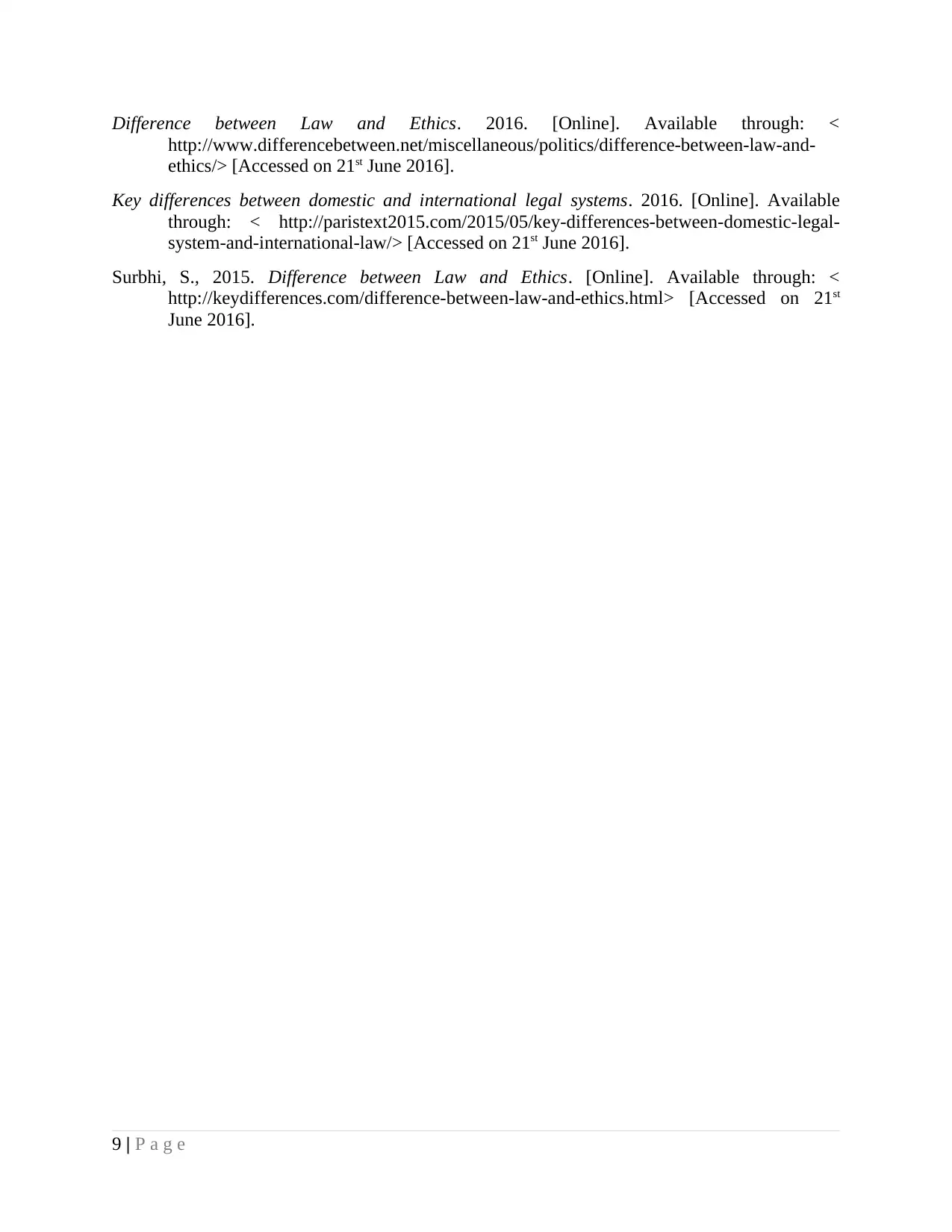
Difference between Law and Ethics. 2016. [Online]. Available through: <
http://www.differencebetween.net/miscellaneous/politics/difference-between-law-and-
ethics/> [Accessed on 21st June 2016].
Key differences between domestic and international legal systems. 2016. [Online]. Available
through: < http://paristext2015.com/2015/05/key-differences-between-domestic-legal-
system-and-international-law/> [Accessed on 21st June 2016].
Surbhi, S., 2015. Difference between Law and Ethics. [Online]. Available through: <
http://keydifferences.com/difference-between-law-and-ethics.html> [Accessed on 21st
June 2016].
9 | P a g e
http://www.differencebetween.net/miscellaneous/politics/difference-between-law-and-
ethics/> [Accessed on 21st June 2016].
Key differences between domestic and international legal systems. 2016. [Online]. Available
through: < http://paristext2015.com/2015/05/key-differences-between-domestic-legal-
system-and-international-law/> [Accessed on 21st June 2016].
Surbhi, S., 2015. Difference between Law and Ethics. [Online]. Available through: <
http://keydifferences.com/difference-between-law-and-ethics.html> [Accessed on 21st
June 2016].
9 | P a g e
1 out of 11
Related Documents
Your All-in-One AI-Powered Toolkit for Academic Success.
+13062052269
info@desklib.com
Available 24*7 on WhatsApp / Email
![[object Object]](/_next/static/media/star-bottom.7253800d.svg)
Unlock your academic potential
© 2024 | Zucol Services PVT LTD | All rights reserved.




